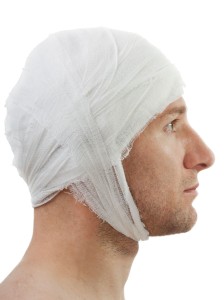 If you enjoy contact sports like fighting, drinking to excess, snow skiing, driving too fast or any of the other risky adventures men (and sometimes women) indulge in, there’s a good chance you’ll suffer a concussion someday.
If you enjoy contact sports like fighting, drinking to excess, snow skiing, driving too fast or any of the other risky adventures men (and sometimes women) indulge in, there’s a good chance you’ll suffer a concussion someday.
For all those folks reading this now and thinking, “Yeah, that’s me. I’m addicted to hardcore, adrenaline-fueled risk taking and action. Bring it on,” here’s a bit of news: You might have already suffered a concussion, and not even about know it. You could have actually been concussed several times. That explains a lot of your erratic behavior of late, doesn’t it?
The life of a daredevil (not Ben Affleck’s portrayal of the Marvel character) can be truly exhilarating. Racing down a mountain slope just ahead of an avalanche, jetting along a highway on a street luge, or getting rid of your pent-up aggression with some sanctioned, amateur boxing, is a hell of a lot better than sitting at home eating tortilla chips and watching reruns of Sponge Bob. And it definitely proves you’re no Square Pants. Even so, heading out into the world for some high-octane fun can potentially cause you a great deal of brain and bodily harm. That’s just a fact.
Just in case you’ve banged your head against something harder than, well … your head, I’d like to offer up some advice about how you can spot the telltale signs of a brain concussion. Yeah, I know you’re a badass, but that doesn’t really matter. Any type of traumatic brain injury should be taken seriously, no matter how minor. Just ask some former NFL players who’ve hit their heads one too many times against big, armored men.
While you might not use your cerebrum all that much, it’s the only one you’ve got — unless you’re like me and keep a coupe of spares tucked around the house in formaldehyde jars. Even if you get hit in the head, or fall down, but don’t lose consciousness, you should still get checked out. Concussions can be very tricky, and you need to be aware of the main signs.
Signs of a Brain Concussion
- Feeling drowsy
- Suffering from headaches (other than your nagging relatives)
- Slurred speech (a pretty severe symptom)
- Light sensitivity
- A loss of balance (physical, but pay attention to the emotional as well)
- Ringing in the ears
- Losing consciousness
- Blurred vision
- Queasiness
- Vomiting
- General confusion
- Strange sleep patterns
- Muscle seizures (a severe symptom)
- Flashing lights in your field of vision (not the cops)
- Irritability
Of course, if a person is acting erratically, extremely confused, fainting constantly or unable to regain consciousness, you’re dealing with a serious concussion. Medical attention should be sought out immediately.
For mild concussions, time and the brain’s rejuvenating properties will generally repair the damage. You’ll need to take it easy for a awhile, apply ice or something cold to the area of cranial impact, and let others know that you may be off of your game for a bit. Over-the-counter pain relievers can be taken to handle the pain. It’s also a good idea to have someone watch over you for an entire day, or even longer, just to make sure your situation doesn’t get worse.
If, at the time of a traumatic head event, or later, you notice signs like excessive vomiting, unequal pupil size, severe aggression, neck pain, slurred speech or the inability to rouse someone from sleep, get yourself, or the person you suspect of suffering from a severe concussion to a hospital immediately.
While being a tough, adventurous guy is commendable, letting your injuries persist unchecked could put you in a world of hurt. You can’t brag about your mountain biking and windsurfing exploits at the bar if you’re in a coma, or sick at home confined to bed — all thanks to ignoring the warning signs of a concussion.
Have fun out there, but take care of yourself. Always wear a “brain bucket” whenever you take part in an activity (street luge, football, tree skiing) that can seriously knock you about.













-300x200.jpeg)
-300x213.jpeg)










